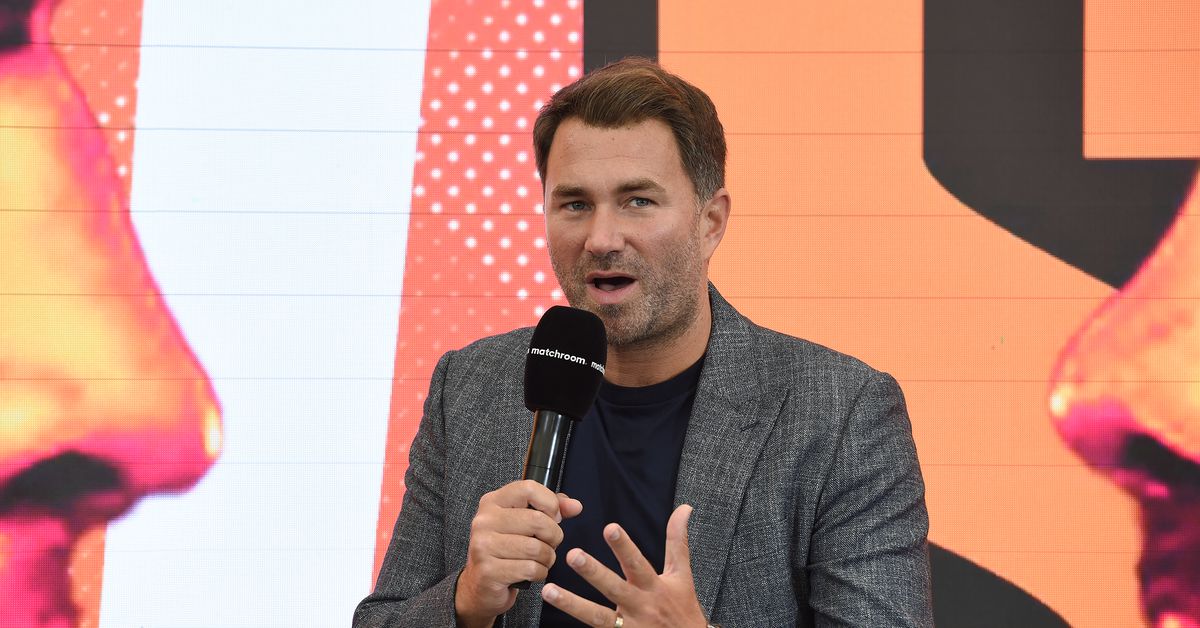In recent years, fighter pay, particularly in the UFC, has become a one of the most talked-about stories in MMA.
Over the past year, fighters like Jon Jones and Jorge Masvidal have complained outright about the UFC’s pay structure. Meanwhile, lesser-known fighters like Sarah Alpar have set up GoFundMe’s to cover the costs of training camp, and with YouTuber-turned-boxer Jake Paul looking for any chance to blast Dana White and the UFC over their business practices, the story doesn’t appear to be going anywhere anytime soon.
However, Eddie Hearn, a fellow promoter of combat sports believes that things could change in the future.
Hearn, the chairman of boxing promoter Matchroom Sport, recently spoke with Ariel Helwani on The MMA Hour, where he outlined the differences in fighter pay between the UFC and boxing and how things came to be that way.
” I think fighter power has fallen down the UFC probably more slowly than in boxing,” Hearn stated. “Very old promoters – every fighter that I represent is my boss. They can be a young fighter just starting out or seasoned veterans fighting for their first bout. I am there to help them. This is my mindset. The old school, the couldn’t say it. They’ve been fighting in boxing for some time now.
“For UFC, where they’ve been very smart is it’s such an honor to get a UFC deal, you see these kids coming out of Bellator or Cage Warriors or wherever it is, the thought of getting a UFC contract is everything. Conor was too large for the UFC. I felt that because of that, I almost laughed at him. The UFC doesn’t need a superstar that’s bigger than Conor McGregor. Conor McGregor became bigger than the UFC, really, and that’s a nightmare for those guys.”
McGregor is a difficult opponent for the UFC since his rise to global fame. McGregor, an Irish legend, has been “retired” multiple times from MMA and worked hard to negotiate with the UFC, including a deal with Proper No. 12 Whisky company. But for Hearn, the fact that the UFC could somehow even stay in business with McGregor and fighters like him is impressive enough, given their earning potential outside of the UFC.
“Don’t forget that the fighter, the representation that fighter has, it’s their responsibility to put the best deal together possible,” Hearn said. “What surprised me is the length of time they’ve been able to manage individuals as they’ve grown. Conor is a great example. Conor should have left the UFC and started his own promotion arm for MMA, which I thought was a good idea. It would be fascinating to learn how Conor managed that relationship. Reports of when he boxed Mayweather, they went 50-50 on the purse, the UFC and Conor. It’s unbelievable, but I also understand that he is under contract. You are not permitted to fight him, so that would be the deal. It all comes down to the deal.
I think a lot of these early deals look great for MMA fighters, but it is only when they become a sizable draw that things change.” I think a lot of these early deals look great for an MMA fighter, it’s only when they become a sizable draw that that changes.”
While the fight pay disparity can be clearly seen in the differences in pay between top fighters and those in boxing, it is even more apparent when you consider the total revenue. The UFC currently takes home around 80 percent of the revenue they generate annually, with fighters collectively pocketing the other 20 percent. This is in comparison to other professional sports organizations in the U.S., which usually operate on closer to a 50-50 split. This is in sharp contrast to Hearn’s split, which he said most boxing promoters used and Hearn suggested as the best way to promote fighting sports.
” The one thing that I can say is that the margins favor the organization over fighters. But, they also show that there are parts and benefits that you might not see when you get involved with the organisation,” Hearn stated.
” It’s an extremely powerful business. In boxing, we work with out bigger fighters on an 80-20 split [in favor of the fighters]. It sounds like theirs is closer to the other way, in terms of revenue. But also that 20 [percent that we take] becomes smaller and smaller as the fight becomes bigger and bigger. How can it be justified that a fighter makes $50 millions, but you make $10million on one fight? This is a huge amount of money. This guys the one putting their health on the line, their life on the line to go in there. But it’s a historic model that I guess will change, and there will be more pressure on the organization as time goes by.”
The UFC and its parent company Endeavor seem to disagree though. Last year, Endeavor CEO Ari Emanuel defended the UFC’s pay model by arguing that fighter pay has risen, while Dana White has taken the less egalitarian stance of “This is mine and this is the way we’re doing it.” But with people like Francis Ngannou and Jake Paul keeping this issue in the spotlight, perhaps one day it won’t be that way.


